Loneliness, Grief and the (Un)Caring State
Collective Ailments in Claudia Rankine’s Don’t Let Me Be Lonely: An American Lyric
DOI:
https://doi.org/10.13135/2612-5641/6801Schlagworte:
Neoliberalism, Lyric Essay, Affect Theory, 9/11, Health HumanitiesAbstract
This essay analyzes Claudia Rankine’s Don’t Let Me Be Lonely: An American Lyric (2004) from the perspective of “ugly feelings” (Ngai 2005) such as disavowed mourning (Butler, 2004, xiv) or loneliness in the aftermath of the 9/11 attacks. Following Butler’s contention of the hindered possibility for community in the recognition of US national vulnerability (2004), I will argue that Rankine’s work underscores the disparities in public recognition of grief and private care for Othered subjects’ pain. In particular, Don’t Let Me Be Lonely displays a series of physical and mental collective ailments in US citizens, such as medicalized depression, as Rankine attempts to bear witness to the institutionalized injustice and erasure of the violence exerted upon America’s precarious bodies, enacting a form of recognition, only if temporary, through the fragmented use of the narrative/lyric ‘I’.
Downloads
Veröffentlicht
Ausgabe
Rubrik
Lizenz
Authors who publish with this journal agree to the following terms:
- Authors retain the copyright and full publishing rights for their submissions to the journal.
- Authors grant the journal right of first publication with the work simultaneously licensed under a Creative Commons Attribution-NonCommercial-NoDerivatives 4.0 International License that allows others to share unedited work for non-commercial purposes with an acknowledgement of the work's authorship and initial publication in this journal.
- Authors are able to enter into separate, additional contractual arrangements for the non-exclusive distribution of the journal's published version of the work (e.g., post it to an institutional repository or publish it in a book), with an acknowledgement of its initial publication in this journal.
- Authors are permitted and encouraged to post their work online (e.g., in institutional repositories or on their website) prior to and during the submission process, as it can lead to productive exchanges, as well as earlier and greater citation of published work (See The Effect of Open Access).




